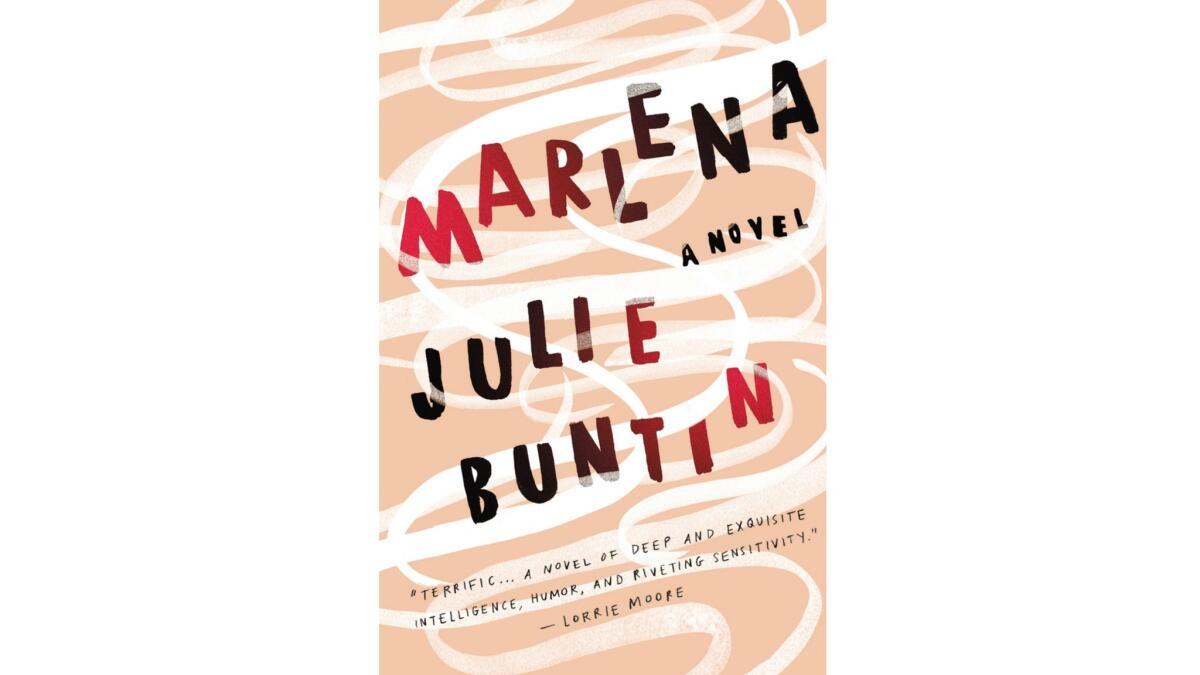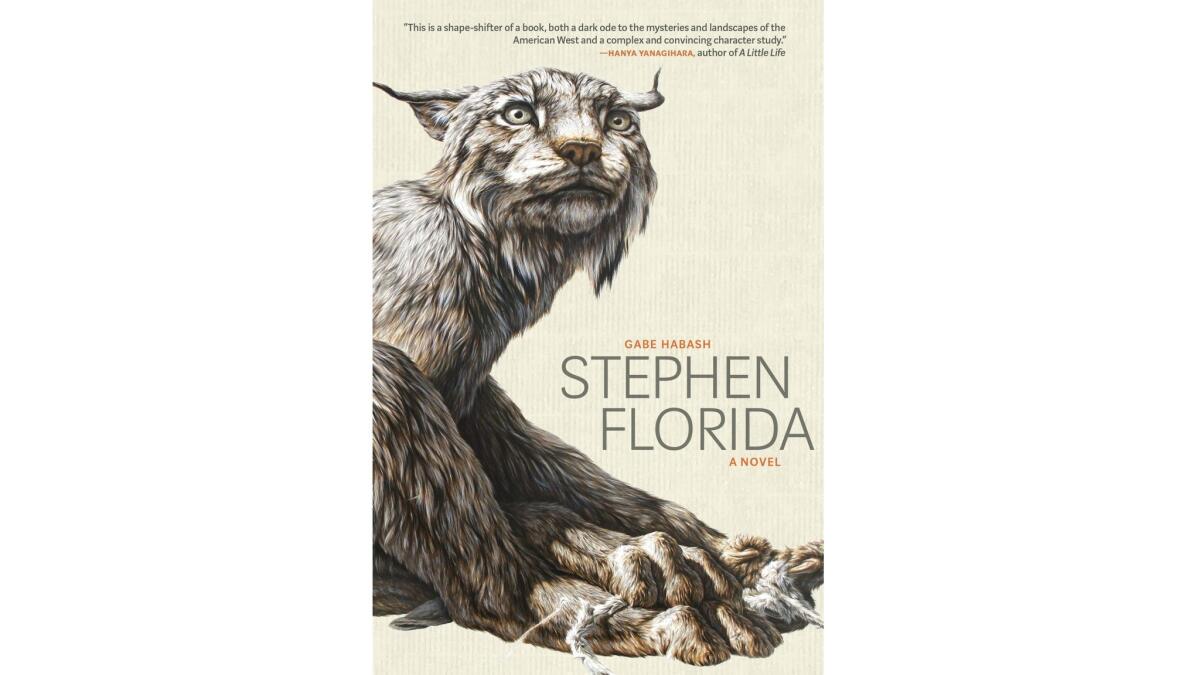Q&A: Gabe Habash and Julie Buntin on publishing their first novels
Julie Buntin and Gabe Habash have a lot in common. They’re both young Midwesterners living in New York. They’re both first-time novelists whose books debuted this year. And they both recently got married — to each other.
The writers share some similarities, but their books couldn’t be more different. Buntin’s “Marlena,” published in April by Henry Holt, is an understated but fiery novel about a teenager named Cat in Michigan who befriends a troubled girl with a drug-dealing boyfriend. Habash’s brash and explosive “Stephen Florida,” released in June by the independent Coffee House Press, follows an obsessed college wrestler desperate to win a national championship.
The authors spoke with The Times via telephone from their home in New York; the conversation has been edited.
Since your books are being released so close to each other, I'm guessing there's got to be some kind of friendly competition going on, right?
Buntin: I don't feel that from Gabe at all. I'm way worse about that. Gabe is very supportive, and 100% has a healthier, less frantically anxious perspective on this whole process. I tend to be more competitive in general. I've tried to keep that in check, and having a partner that's very chill about it is helpful. It can be hard not to play the comparison game, though.
Habash: I don't really feel competitive in general, but with Julie, our books are so different. I'm published by a small press, she's published by a bigger press. We've written very different books, so in a lot of ways, our situations are really different despite the fact that they're both fiction and they're coming out around the same time. We both hit enough of the benchmarks and goals that we wanted through the process. I think that we both are very happy with our own experiences, and for each other's experiences, so I don't think there's that much competitiveness.
Buntin: This is corny sounding, but I think "Stephen Florida" is one of the best books I've ever read. So anything you read that you love, you just want it to do well, other people to feel the same way you do. I love Gabe's book, so even if, say, Scott Rudin buys the film rights, my excitement about the book getting the recognition it deserves mostly rises above any competitive feeling.
Habash: Just to piggyback on that, going back to when we were writing the first drafts and showing each other our work before it's ready to be shown widely, I think for both of us, the other's opinion is very important. I would not be happy if Julie didn't like my book. That would make me miserable. There's a reason why I'm showing her my book before anybody else, because I really want to get her input. So in that sense, both of the books are very important to both of us.
How long have you two been together?
Habash: We've been married since September 2015, and we've been together since 2011, right?
Buntin: Yeah, we met in grad school at NYU, I guess 2011 or thereabouts. We were both fiction students. Gabe was a year ahead of me in the program, but we did have a class together. I think that was my first semester.
Did you write “Marlena” and “Stephen Florida” at the same time?
Buntin: Kind of.
Habash: Your book was in a different form for a while. I started my first draft in July of 2013. Do you know when yours was?
Buntin: It was earlier than that. I had been working on a version of this book that changed a lot. I had been working on it since 2011, basically. But Gabe was working on something else, and then started this. He's faster than me. There were definitely times when he was working on "Stephen Florida" and I was working in the other room, and you can hear the other person typing, and you're like, "Oh, they're actually writing." Nothing makes me feel more insecure.
And you’re just checking Twitter or something.
Buntin: Yeah! When you're sitting in silence and you can hear the thoughts coming from the other room. I definitely had a lot of times like that. I'm way more of a procrastinator.
Did the same thing happen to you, Gabe? Were there times when you could hear Julie typing and you were kind of stuck?
Habash: We sort of work differently. Julie will put off writing, but then she'll write for like 18 hours and I'll periodically put snacks in front of her while she's sitting at her computer because she'll be immobile for an entire day. It's like one step removed from having a bedpan there. But my habit was, I would come home from work and write for an hour or two, and then I just had no more mental energy. I would write on a more frequent basis for shorter periods of time, whereas Julie worked for larger swaths of single sittings.

It sounds like you complement each other pretty well.
Buntin: Gabe would be like, "When will you be done? 7 p.m.?" and I'd be like, "Sure." But that would really mean, like, 11. I would find myself a little bit jealous of the more moderate approach. Every writer is different in how they go about it, but his way seems saner to me somehow.
Did you ever reach out to each other for advice, if you were blocked or you just had a part of the book you weren't sure about?
Habash: In general, we both are each other's first readers. When I was writing the first draft, I wrote the first 50 pages and showed them to Julie, and I was like, "Is this good or bad?" and she was like, "It's good." So I just wrote the entire rest of the draft without showing her anything after that, because it’s important to me when I write, when it's in the first draft, that it's something only I have access to. And then once I finished the first draft, I showed it to Julie, and then from there, it started to get worked on. It's not only the novel, it's anything I write, I show to Julie before anybody else, and I almost don't send anything out unless Julie looks at it at least once or twice.
Buntin: I feel a little bit like that too. I can't imagine what it would be like to be married to someone who doesn't do the same thing as you, though many people are like, "Oh, my God, that sounds terrible," especially now with our books coming out at the same time. I really trust Gabe's take. I feel the same way — I show him stuff before other people, and definitely when the book was getting ready to go out.
Have you ever thought about collaborating on a writing project with each other?
Buntin: No.
Habash: No, no.
Buntin: I don't know why, but not only have I never thought about that, that sounds like — why does that sound so terrible?
Habash: I don't want to collaborate with anybody.
Buntin: I think we both have pretty distinct ideas about what kind of fiction we want to write, and our sensibilities are very different. I think it would be really hard.
Habash: Speaking for my book in particular, Julie edited that very heavily. The book's dedicated to her for a reason, I'll put it that way. That's fairly close to collaboration, I would say.
Buntin: I don't think that's true.
Habash: Thanks. [Laughs]
Buntin: Whatever.
Your books both take place in the Midwest, in Michigan and North Dakota, respectively. Did you both grow up there?
Habash: Yeah, we both did. Julie grew up in Michigan and I grew up in Ohio.
Was there any question when you started these books that you wanted to set them in the Midwest?
Buntin: For me, not really. I feel like in writing “Marlena,” I was channeling some of my own homesickness for the Midwest. I moved away from Michigan at a similar age to Cat, and I just want to go home so bad all the time, even though I've been in New York for over a decade. I don't think I couldn't have written about a place that I am currently living in; I needed distance to be able to imagine it.
Gabe, did you ever live in North Dakota?
Habash: No. I think Julie and I are similar in that regard. I don't like writing anything close to my own daily experience, because I'll just be really bored. I had never been to North Dakota before I wrote the book. I just thought of the most lonely and isolated and removed from my own experience place, the only qualifier being that I knew it was going to be set in America. I thought of the location that was farthest and furthest removed from my own experience and work in Manhattan. So North Dakota, having never been there, was sort of like a blank slate. What's actually in North Dakota? How many people actually live there?
Buntin: Gabe didn't visit North Dakota until really recently, after the book was already in galleys, which I thought was so interesting. I was writing from a place of fictionalized memory, but [his writing] was completely imagined and researched.
Habash: It's a really strange place. Both of our settings are very evocative, and I think for different reasons. Julie has a very strong connection to her upbringing and growing up [in Michigan], and my book has no connection. [Laughs]
Julie, I saw on Twitter that Gabe has a T-shirt with your book cover on it.
Buntin: Oh, my God, that's the most embarrassing thing on Earth. That didn't even come from Gabe. That came from Colin Drohan, who's the program coordinator at Catapult, where I work, who's been working with me for about a year. He got it for me as a thank-you gift for writing his grad school letter of recommendation. And I think he was trolling me a little bit. [Laughs] Then Gabe got wind of it. So now he and Colin just troll me with pictures of that T-shirt.
Habash: We had dinner with some of Julie's friends who live out of town and who Julie hadn't seen for a while. I was wearing that shirt and Julie made me change it right before we left. I was going to wear it out, and she wouldn't let me do it!

A “Stephen Florida” book cover T-shirt would actually look pretty cool.
Buntin: I don't know why I haven't done that in retaliation.
Habash: We can print it on a singlet.
Buntin: That's a really good idea.
Sign up for our Book Club newsletter
Get the latest news, events and more from the Los Angeles Times Book Club, and help us get L.A. reading and talking.
You may occasionally receive promotional content from the Los Angeles Times.




